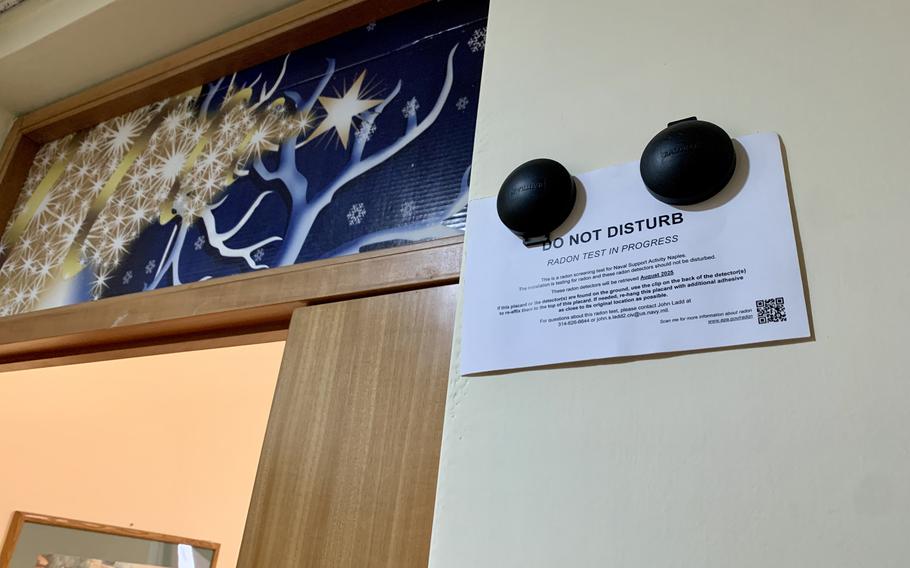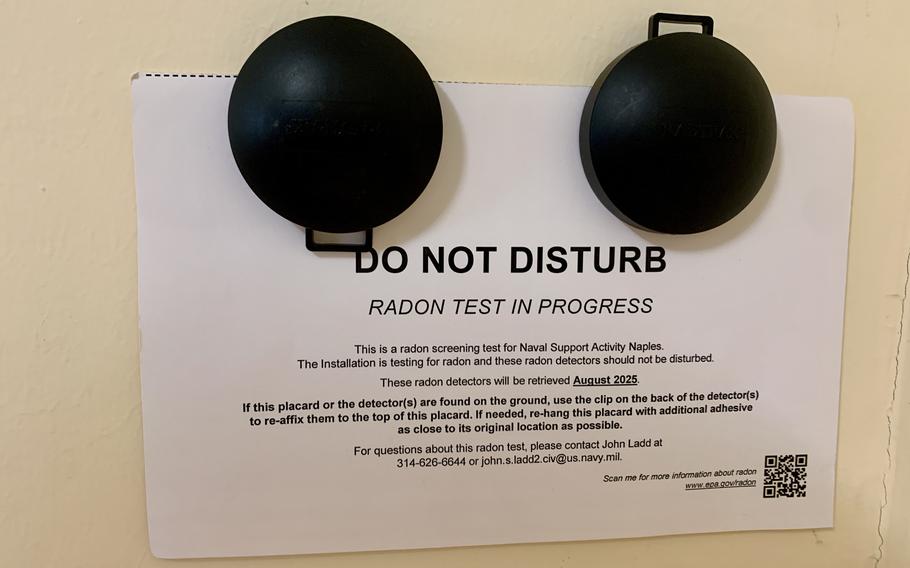
U.S. Naval Support Activity Naples in Italy has begun radon testing at single service member housing and nonresidential buildings. Results are expected in October 2025. (Alison Bath/Stars and Stripes)
NAPLES, Italy — The Navy’s largest installation in Italy failed to notify its military personnel and their families that the base had the service’s highest rating for potentially excessive levels of an odorless, colorless gas linked to lung cancer, a Defense Department Inspector General investigation has revealed.
U.S. Naval Support Activity Naples also didn’t do timely testing for radon gas at some homes, offices, medical facilities and child care centers, as required by Navy policy.
And although officials knew about the base’s risk rating for possibly elevated levels of the radioactive gas, they didn’t inform nearly 4,000 military personnel living off base that their homes could be tested, according to a DOD IG report released last week.
The failures could “create a potential risk to the health and safety of DoD personnel and their families stationed at NSA Naples,” the IG said.

A radon testing kit is affixed to the wall of an office at U.S. Naval Support Activity Naples in Italy on Aug. 19, 2024. The base recently started radon testing of its single service member housing and nonresidential buildings after a Defense Department Inspector General audit found that the installation was not in compliance with Navy policies. (Alison Bath/Stars and Stripes)
The base worked with the IG to develop the report and is complying with all recommendations, said Lt. jg Valentine Mulango, a spokesperson for NSA Naples. He added that the health and safety of sailors, civilian personnel, contractors and their families is a top priority.
In a June 27 letter, Rear Adm. Brad Collins, commander of Navy Region Europe, Africa, Central, concurred with several of the IG’s recommendations related to the report and noted that the base had contracted to begin radon testing of single service member housing and other buildings this month.
Since 2016, the Navy has classified NSA Naples in Radon Potential Category 1, its highest rating, according to the IG report.
That same year, officials found that 24 rooms in nonresidential facilities at the base had radon levels ranging from 4.1 to 35.6 picocuries per liter of air.
U.S. Environmental Protection Agency guidelines state that levels consistently at or above 4.0 picocuries per liter of air are hazardous.
Radon forms when the radioactive metals uranium, thorium or radium break down naturally in rocks, soil and water. People are exposed to the gas when it seeps through cracks and gaps in buildings, according to the EPA.
Radon levels can be lowered by means ranging from temporary measures like increasing ventilation to adding a professionally installed depressurization system.
The agency estimates that radon causes more than 21,000 deaths from lung cancer each year and is the No. 1 cause of the disease among nonsmokers.
About 6,700 DOD personnel and family members are stationed at NSA Naples and nearly 60% live off base, according to the IG report.
The IG launched its investigation after receiving a whistleblower complaint regarding the base’s handling of its radon management program, particularly as it related to off-base housing. The IG conducted its subsequent review from November 2023 to June 2024.
Investigators found that while NSA Naples appropriately conducted radon testing of on-base residences typically used by service members and their families, base personnel made mistakes in interpreting policies that required testing of other buildings on the installation.
As a result, the base’s single service member housing and most of its roughly 84 nonresidential buildings hadn’t been tested for more than seven years. Policy requires testing at least every five years, the IG report stated.
NSA Naples also didn’t comply with timelines for mitigating radon levels that meet or exceed EPA guidelines.
For example, a 2023 report found that despite mitigation efforts, nearly half of the 24 rooms identified during testing in 2016 continued to have hazardous radon levels. Those rooms included one used for child care.
As of March, the base had not made changes to the mitigation systems in those rooms, the report stated.
Investigators also determined that a lack of DOD policy on informing overseas personnel living off base about the known potential for elevated radon levels hindered NSA Naples’ ability to effectively tell its community about the risk.
The base did release the results of radon testing in on-base military housing. But officials never stated that NSA Naples was in the highest category for potentially elevated radon levels, investigators found.
The report also noted that the DOD had not determined whether it has the authority to provide at-home radon testing kits to personnel living off-base overseas.
As a result of its findings, the IG made 10 recommendations, including that the Pentagon implement policy that ensures DOD personnel living off-base are better informed about the potential for elevated radon levels.
The IG also recommended that the base update its radon management plan and closely monitor contracted radon testing.